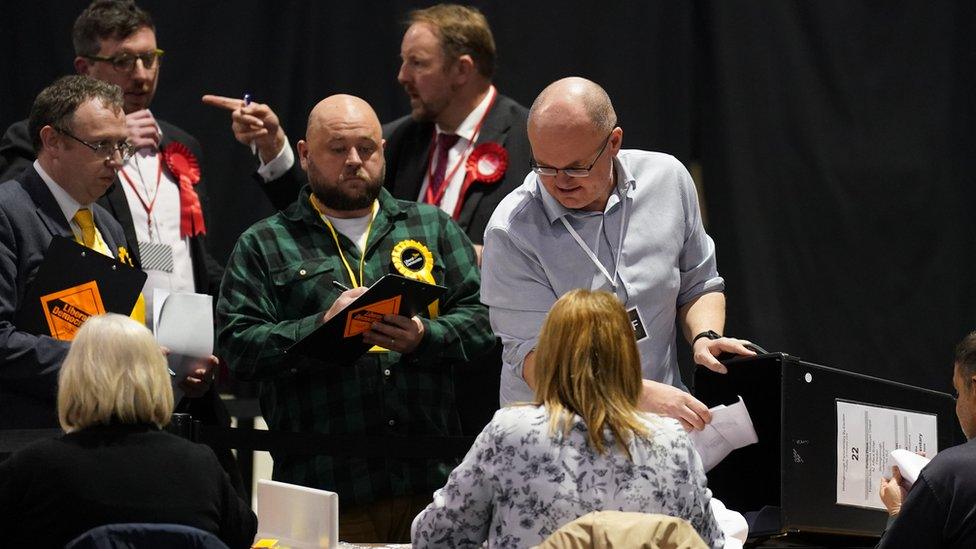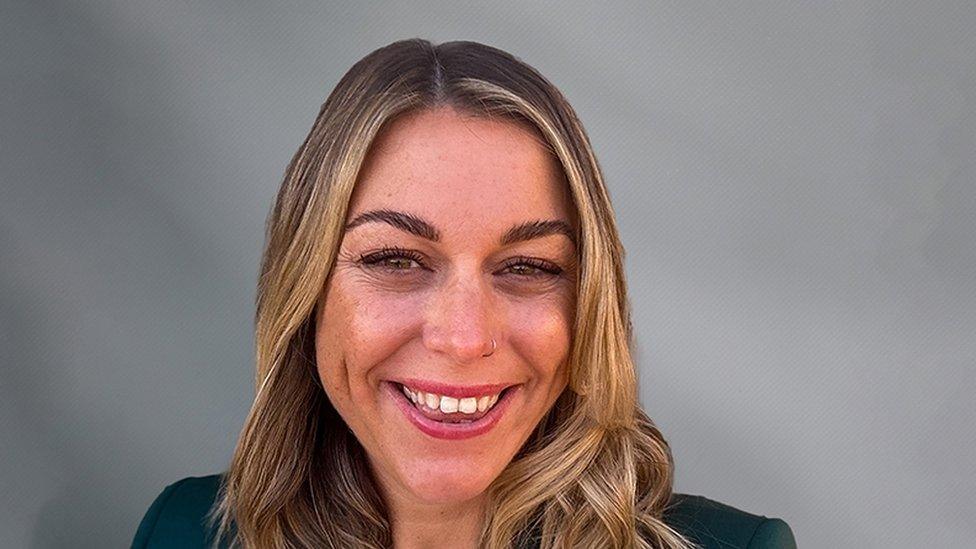Behind the scenes at next month's Northants commissioner vote
- Published

North Northamptonshire's votes will be verified and counted at Kettering Conference Centre
This week sees the deadline for registering to vote for anyone who is not yet on the electoral register.
The election to choose Northamptonshire's next police, fire and crime commissioner takes place in less than three weeks.
But how is the network of polling stations created, and what happens to votes once they are cast?

The under-the-stairs polling station in Winwick
For Northamptonshire's councils, the announcement of an election must provoke a simultaneous groan.
Distributing polling cards, setting up polling stations, collecting the votes and then counting them involve one of the biggest logistical operations any council has to undertake.
The location of polling stations is regularly reviewed, so anyone who automatically goes to their usual place to cast their vote might find the doors locked, or that their street has been assigned to another station.
In-person voting takes place at a bewildering variety of locations - schools and village halls are common, but Northamptonshire has some more unusual venues.
People in parts of Wellingborough are used to handing over their voting slips where they usually grab their pint at the Ock 'n' Dough pub, while the inhabitants of Winwick, near Daventry, usually mark their X on the ballot paper under the stairs of a private home.

The Ock'n'Dough pub in Wellingborough - site of a polling station
An army of staff, often former or current council staff or retired people, is recruited to run the polling stations.
The presiding officer is in charge and must be "a team player who has the ability to work calmly under pressure, external" and have a "professional and politically neutral manner".
They work a 16-hour day, cannot leave the polling station and they earn £272 plus a training fee and mileage, external.
Polling clerks assist the president officer and earn £200 plus training fee and mileage.
After polls close at 22:00, it is the presiding officer who takes the votes on their next journey to the verification venue.
As the polling station staff head off for a good night's sleep, a second army of verification assistants will be preparing to check every single vote in return of an hourly wage of £17.
Their job is to make sure that all the ballot papers have been brought to the count and provide a figure of voting slips which has to agree with the total number of votes in the figure announced when the result is revealed.
Verification for the West Northamptonshire area will take place overnight on Thursday in Benham Sports Centre in Northampton, while the North Northamptonshire votes will be checked at Kettering Conference Centre on Friday morning.
The count will take place at both venues on Friday afternoon.

West Northamptonshire's votes will be verified and counted at the Benham Sports Centre in Northampton
The third temporary army of election staff, the counting assistants, will take their place at rows of tables and each ballot box will be solemnly emptied.
They receive £14 per hour for what, arguably, is one of the most important jobs in any democracy.
A lot of their time is spent waiting for the next box to be counted, and finding out more about the life of the counting assistant sitting next to them.
One key thing they have to remember is that each vote must be secret and no-one must be able to find out how any individual voted.

Kettering Conference Centre was the venue for the Wellingborough by-election count
The ballot papers are kept face upwards throughout the counting process so no-one can see the number printed on the back of the ballot paper, even though this on its own would not be enough to identify a voter.
The papers have to be visible to candidates, agents and observers to reassure them that everything is transparent.
In a "first-past-the-post" election like the one taking place in Northamptonshire on 2 May, votes for each candidates are put into bundles of a pre-determined size.
Another counting assistant checks the totals in each bundle.
Even before the result is announced, there will be some glum faces and some jubilant ones among the candidates and agents.
They will hear the result before it is made public to give them a chance to ask for a recount if they are not happy with the accuracy of the figures.
Sometimes, the recounts can take hours. There were seven in the Peterborough constituency in 1966, and it took eight-and-a-half hours to confirm that the Conservative candidate had won by just three votes.
There were also seven recounts in Brighton Kemptown in 1964.

The-then High Sheriff Milan Shah declares the result of the Wellingborough by-election
Even the recent Wellingborough by-election had a limited recount.
If the returning officer refuses a request for a recount, a petition can be made to the HIgh Court of Justice for the result to be reconsidered.
Once the result is announced, the ballot boxes, signs, voting booths and little pencils will be locked away, ready for the whole process to begin again when the General Election is called sometime between now and the end of January 2025.

Follow East of England news on Facebook, external, Instagram, external and X, external. Got a story? Email eastofenglandnews@bbc.co.uk, external or WhatsApp 0800 169 1830
- Published26 January 2024

- Published5 May 2015
